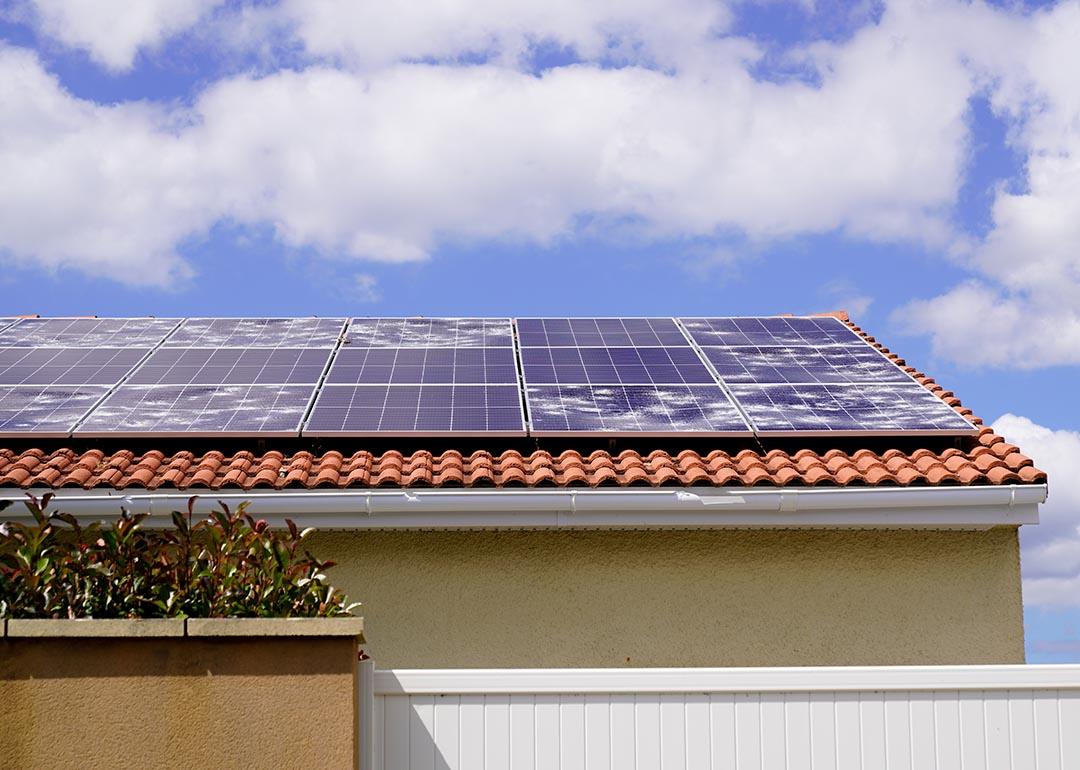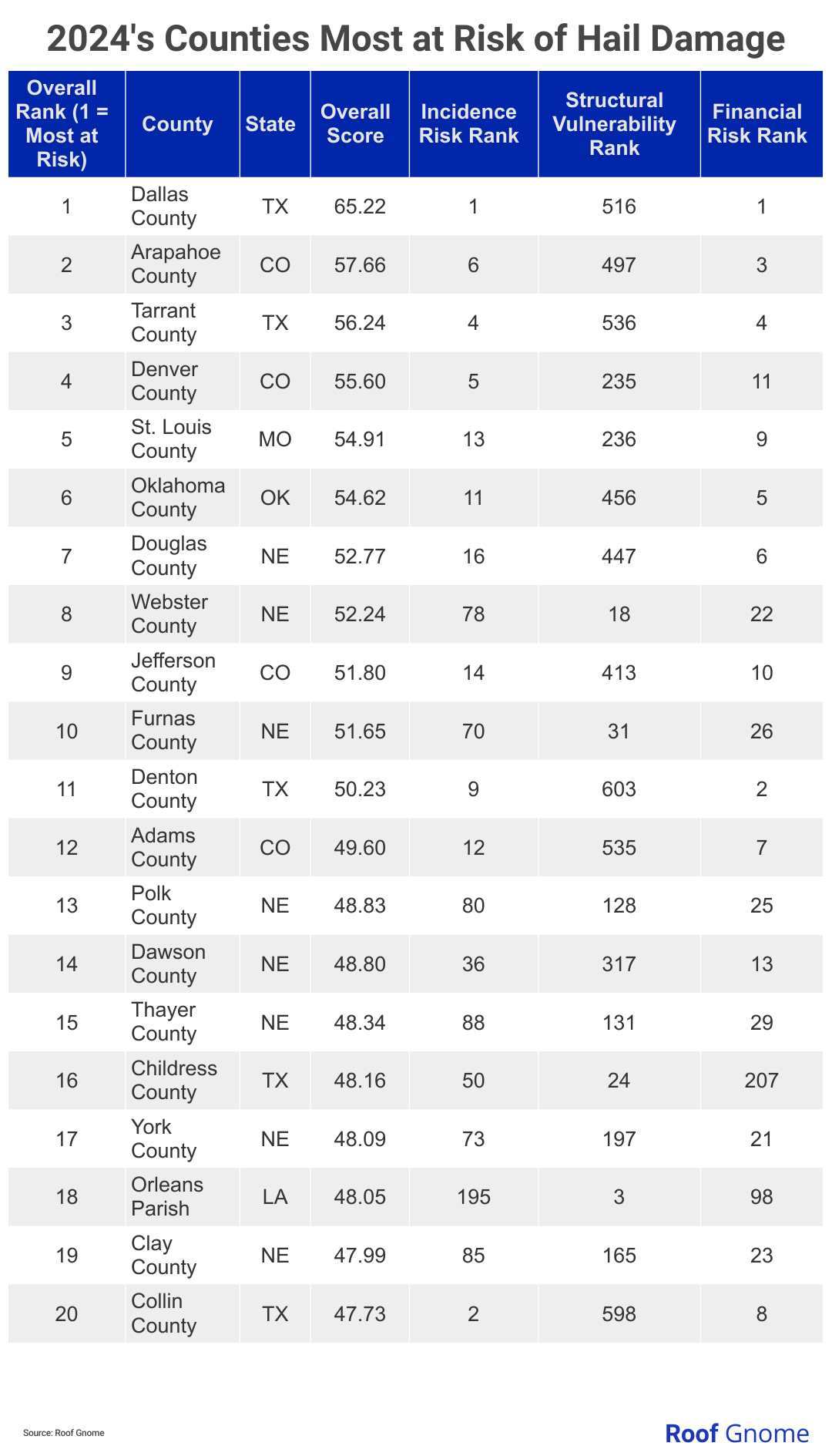
As storm season approaches, is your county a target for hail damage in 2024?
This story was produced by Roof Gnome and reviewed and distributed by Stacker Media.
As storm season approaches, is your county a target for hail damage in 2024?
Where in the U.S. are roofs, cars, and solar panels most likely to be destroyed by hailstones? With hail season approaching, Roof Gnome ranked the U.S. counties most at risk of hail damage in 2024.
Over 600 U.S. counties with a relatively moderate to very high hail risk, according to the Federal Emergency Management Agency, were compared, based on 3 categories. Overall hail risk, expected economic loss from hail storms, and the number of homes with solar panels and garages, among 7 total metrics, were considered.
See where your county scored in our ranking. To learn how we ranked the counties, see our methodology.

20 U.S. counties most at risk of hail damage in 2024
Top 5 close up
No. 1: Dallas County, Texas | 3 Biggest Cities: Dallas, Garland, Irving
- Overall Score: 65.22
- Hail Risk Score: 100 | Rank: 1
- Average Monthly Searches for Hail-related Keywords Over Past Year: 330 | Rank: 1
- Number of Existing Structures With Solar Installations: 1,200 | Rank: 21
- Total Expected Annual Economic Loss From Hail: $102.9 million | Rank: 1
- Average State Home Insurance Premium: $1,446 | Rank: 240 (tie)
No. 2: Arapahoe County, Colorado | 3 Biggest Cities: Aurora, Centennial, Littleton
- Overall Score: 57.66
- Hail Risk Score: 99.9 | Rank: 4
- Average Monthly Searches for Hail-related Keywords Over Past Year: 120 | Rank: 9
- Number of Existing Structures With Solar Installations: 3,400 | Rank: 8
- Total Expected Annual Economic Loss From Hail: $78.8 million | Rank: 4
- Average State Home Insurance Premium: $1,885 | Rank: 100 (tie)
No. 3: Tarrant County, Texas | 3 Biggest Cities: Fort Worth, Arlington, Grand Prairie
- Overall Score: 56.24
- Hail Risk Score: 99.97 | Rank: 2
- Average Monthly Searches for Hail-related Keywords Over Past Year: 150 | Rank: 6 (tie)
- Number of Existing Structures With Solar Installations: 1,935 | Rank: 16
- Total Expected Annual Economic Loss From Hail: $85.5 million | Rank: 3
- Average State Home Insurance Premium: $1,446 | Rank: 240 (tie)
No. 4: Denver County, Colorado | Overall Score: 55.6
- Hail Risk Score: 99.71 | Rank: 10
- Average Monthly Searches for Hail-related Keywords Over Past Year: 150 | Rank: 6 (tie)
- Number of Existing Structures With Solar Installations: 3,600 | Rank: 7
- Total Expected Annual Economic LossFrom Hail: $35.5 million | Rank: 10
- Average State Home Insurance Premium: $1,885 | Rank: 100 (tie)
No. 5: St. Louis County, Missouri | 3 Biggest Cities: Florissant, Chesterfield, Oakville
Overall Score: 54.91
- Hail Risk Score: 99.78 | Rank: 8
- Average Monthly Searches for Hail-related Keywords Over Past Year: 60 | Rank: 17
- Number of Existing Structures With Solar Installations: 1,000 | Rank: 23
- Total Expected Annual Economic Loss From Hail: $47.6 million | Rank: 7
- Average State Home Insurance Premium: $1,786 | Rank: 176 (tie)
The upshot
Hail Alley encompasses the central region of the U.S. — from Wyoming to Texas — where most hail storms occur. Three states stood out with dozens more counties than the other Hail Alley states in the most vulnerable half of our ranking. 52 Nebraska, 51 Texas, and 34 Kansas counties demonstrated high risk of both hail and economic loss from the resulting damage.
Four North Texas counties encompassing the Dallas-Fort Worth metro and Arapahoe County, Colorado (No. 2), which contains Aurora, landed among the 5 counties with the highest annual total expected economic losses due to hail — from over $59 million to nearly $103 million. In a preventive effort (thanks to car-dependent lifestyles), they also scored among the 100 counties with the most garages.
Hail and tornadoes can go hand in hand, which explains why many tornado-prone regions demonstrated high hail risk, such as 16 Illinois, 16 Oklahoma, and 14 Colorado counties that landed in the riskier half of our ranking.
Behind the ranking
To rank the Counties Most at Risk of Hail Damage, the factors (metrics) that are most relevant were determined. We then assigned a weight to each factor based on its importance and grouped those factors into 3 categories: Incidence Risk, Structural Vulnerability, and Financial Risk. For each of the 604 counties with a relatively moderate to very high hail risk according to FEMA, we then gathered data on each factor from the Federal Emergency Management Agency, Forbes, Google Ads, Project Sunroof, U.S. Census Bureau, and Zillow.
Finally, we calculated scores (out of 100 points) for each county to determine its rank in each factor, each category, and overall. A county's Overall Score is the average of its scores across all factors and categories. The highest Overall Score ranked "Most at Risk" (No. 1) and the lowest "Least at Risk" (No. 604).
Storm resilience: Come hail or high water
Nearly 7,000 hail events occurred in 2023 — over 2,500 more than were reported in 2022. Scientists predict that the U.S. will see stronger and more frequent hail storms in the coming years due to climate change.
Hail can smash windows and roofs, accumulate, and clog storm drains — which leads to flooding — and can injure or even kill humans and animals. It can also damage solar panels, gutters, HVAC systems, and other expensive elements of your home.
While some solar panels are designed to withstand pellets of ice, none is impenetrable — especially by golf ball-sized hailstones. Just fixing your roof after a hail storm can cost hundreds or thousands of dollars.



